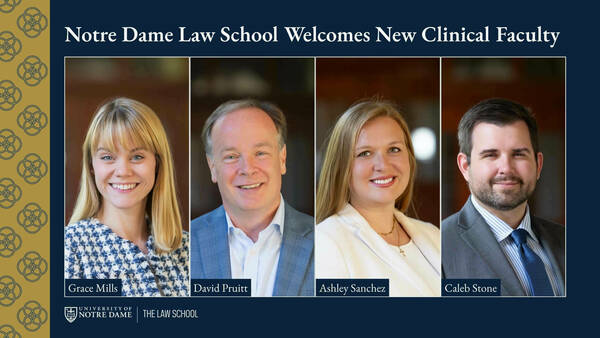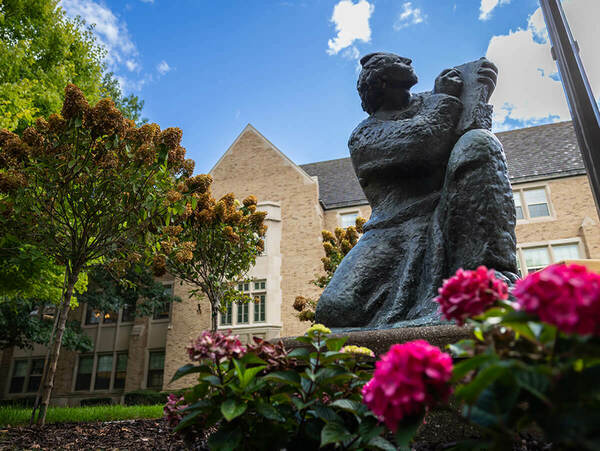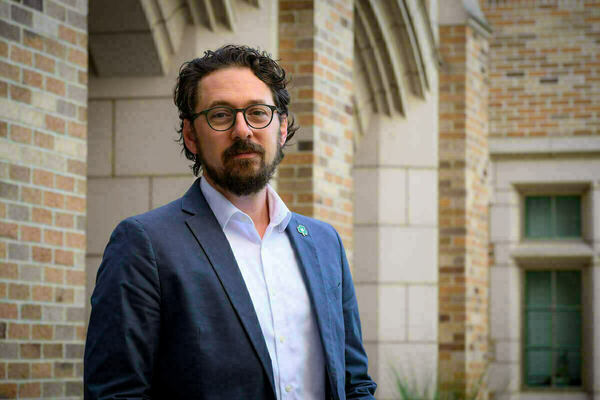Fighting poverty while preserving forests: new research aims to balance economic gains and environmental conservation
Initiatives aimed at fighting poverty in low-income countries have achieved significant progress, cutting extreme poverty globally by more than 65 percent since 1990, according to the World Bank. Yet amid their economic benefits, many poverty reduction programs also cause environmental damage, leading to deforestation and air and water pollution. These adverse effects, which exacerbate existing economic inequalities, are felt most acutely by populations living in and near forests.
Recognizing that economic and environmental well-being are connected, an interdisciplinary team of Notre Dame researchers is studying the effectiveness of poverty reduction programs in rural areas in the Global South and identifying interventions that can alleviate poverty while conserving the environment. Countries in the Global South are home to 90 percent of the 600 million people who live in extreme poverty, subsisting on less than $2.15 per day.
“There’s a real need for evidence that shows the relationship between economic and environmental impacts,” said Daniel C. Miller, an environmental policy expert and the Coyle Mission Collegiate Associate Professor in the Keough School of Global Affairs. “An increasingly degraded natural environment makes it more difficult to sustain human well-being and increases the risk of people falling deeper into poverty.”
The project is funded by Notre Dame’s Poverty Initiative, a University-wide effort to create a world intolerant of poverty by expanding knowledge about how to solve it. Joining Miller as primary investigators are geographer Ellis Adams, political scientist Krister Andersson and economist Lakshmi Iyer. All four researchers are core affiliate faculty members of the Pulte Institute for Global Development, part of Notre Dame’s Keough School of Global Affairs.
“The interdisciplinary expertise of this group enables us to study these issues in a holistic manner, using both quantitative and qualitative methods and a variety of data sources,” Iyer said. “While my expertise is in poverty alleviation and quantitative methods, my colleagues are experts on forest conservation, survey design, remote sensing data, systematic literature reviews and qualitative analysis. Collaborating with them has been a great learning experience so far.”
Drawing on their diverse geographical expertise and field experience, the researchers will focus on tropical forest regions in three countries: India, Ghana and Peru. Working closely with local communities, businesses, governments and research partner organizations, they will conduct randomized controlled trials of interventions designed to reduce poverty while conserving natural resources. Possible interventions may include support for community-based forestry businesses, entrepreneurship training, incentive payments for ecosystem services such as carbon sequestration and new community-based monitoring and enforcement tools.
“To be successful and sustainable over the long term, policy interventions need to be supported by the local community,” Iyer said. “Community involvement in the design and implementation of any project is the best way to ensure local support.”

The researchers, who will begin fieldwork this summer, plan to translate their research into recommendations for policymakers. All four scholars have policy experience with organizations including the Food and Agriculture Organization, the World Bank and the government of India.
The project will include an advisory board of key stakeholders, including representatives from community, government and donor organizations such as the World Bank, who will help guide the project, and a multi-disciplinary cohort of graduate students and postdoctoral scholars who are central to the research.
“The collaborative nature of this project is critical for its success,” Miller said. “This diverse team will help ensure that new knowledge gained about the complex relationship between poverty and forests leads to lasting poverty alleviation and environmental protection.”
Originally published by at keough.nd.edu on March 03, 2025.
Latest Research
- ND research teams awarded funding to address sustainability challenges around the worldNotre Dame's Just Transformations to Sustainability Initiative has awarded funding to three cross-disciplinary faculty teams leading research on pressing sustainability issues—including forest conservation in the Amazon, watershed…
- Fighting to improve hurricane forecastsResearchers at Notre Dame are improving hurricane forecast accuracy, giving officials time to evacuate and protect residents. Read the article
- 2025 Naughton Fellowships awarded to four joint faculty projectsThe University of Notre Dame’s Naughton Fellowship program has announced its faculty awardees for the 2025-2026 cohort. Faculty from leading Irish universities and Notre Dame have come together to work on four research projects as a part of the Naughton Faculty…
- Notre Dame Law School Welcomes Four New Clinical Faculty Members for 2025–26Notre Dame Law School is pleased to welcome four new clinical faculty members for the 2025–26 academic year. “It is an honor to welcome such a distinguished group of clinical professors to Notre Dame Law School. Their impressive achievements and deep sense of vocation will enrich our academic…
- Six early-career scholars join the inaugural Provost’s Postdoctoral Fellowship Program.Six interdisciplinary scholars have joined the College of Arts & Letters at the University of Notre Dame to continue their research, obtain invaluable support, and engage in professional development as part of the inaugural Provost’s…
- Politics inspired Democracy Initiative managing director from early ageThis is the first in a series of features highlighting the managing directors of the University's strategic initiatives. The managing directors are key (senior) staff members who work directly with the faculty directors to help implement and operationalize the vision for the initiatives, oversee initiative staff, and serve as thought partners for the faculty directors.












